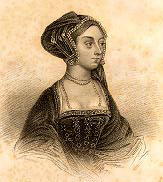Anne Boleyn
Anne Boleyn was the mother of Elizabeth I and the second wife of Henry VIII. Anne spent her childhood in the court of Queen Claude of France where her father was stationed as a diplomat. Soon after she returned to the English court, where she attracted considerable attention*, Henry fell passionately* in love with her.
Henry ended his six year affair with Anne's older sister, Mary, and tried to convince Anne to take her place. Anne refused to lower herself to the undignified role of mistress, however, and Henry was determined to marry her.
Six months before his divorce from Catherine of Aragon, Anne and Henry were secretly married*.
An abrupt end
In due course, Anne gave birth to Henry's second daughter, Elizabeth. Both parents were devastated that the child was not a boy, and Henry refused to have anything to do with Elizabeth for the first few years of her life.
In January 1536, shortly after the death of Catherine of Aragon, Anne miscarried of a male fetus. Henry was furious and determined to get rid of Anne. He claimed that Anne had seduced him into marrying her using witchcraft*. Eventually, Henry managed to produce evidence that Anne had enjoyed affairs with no less than five other men--including her brother. Anne, strong* to the end, was executed as an adulteress in May of 1536.
Footnotes
-
Anne Boleyn: "wild for to behold"
One of those attracted to her was the poet, Sir Thomas Wyatt, who refers to her in one of his sonnets:
Whoso list to hunt, I know where is an hind,
But as for me, alas, I may no more;
The vain travail hath wearied me so sore,
I am of them that furthest come behind. . . .
There is written her fair neck about,
"Noli me tangere" [touch me not], for Caesar's I am,
And wild for to behold, though I seem tame. -
A love letter
For a man who hated reading and writing, the love letters Henry wrote to Anne are expressive of his feelings for her, or of the strength of his passion:
MINE OWN SWEETHEART, these shall be to advertise you of the great elengeness [loneliness] that I find here since your departing. . . . I think your kindness and my fervence of love causeth it, for otherwise I would not have thought it possible that for so little a while it should have grieved me; but now that I am coming toward you, methinketh my pains been half released, and also I am right well comforted, insomuch that my book maketh substantially for my matter, in writing whereof I have spent above iiij [four] hours this day, . . .wishing myself (specially an evening) in my sweetheart's arms, whose pretty ducks [breasts] I trust shortly to kiss. Written with the hand of him that was, is, and shall be yours by his will, H.R.
(Written in July, 1528; Henry's book, A Glasse of Truthe, was a theological argument for the annulment of his marriage to Catherine.) -
Elizabeth I, the bastard?
This secret marriage, in which Elizabeth was conceived, was itself rendered null and void when Henry realized Anne would not provide him with a male heir. Elizabeth thus became, like her half-sister Mary, an illegitimate child, with no claim to the throne.
-
Infatuation and witchcraft
In Antony and Cleopatra, Antony, furious at his defeat, calls Cleopatra a "spell," a "witch" (4.12.30,47); Othello describes in graphic detail the magic in Desdemona's lost handkerchief that would, "while she kept it. . . subdue [him]/Entirely to her love" (3.4.58- 59). In the same play, Brabantio accuses Othello of using sorcery to seduce Desdemona:
She is. . . corrupted/By spells and medicines bought of mountebanks
(1.3.60-61). -
Anne gets the last word
Anne's strength of character is visible in her last letter to Henry from the Tower of London, in which she asserts that the fickleness of his affections was the only cause of her rise to the throne, and subsequent fall:
And to speak a truth, never a prince had wife more loyal in all duty, and in all true affection, than you have ever found in Ann Boleyn, . . . Neither did I at any time so far forget myself in my exaltation, or received queenship, but that I always looked for such an alteration [change in fortune] as now I find; for the ground of my preferment being on no surer foundation than your grace's fancy, the least alteration, I know, was fit and sufficient to draw that fancy to some other subject. . . . From my doleful prison in the Tower, this sixth of May [1536].
Your most loyal and ever faithful wife
ANN BOLEYN
